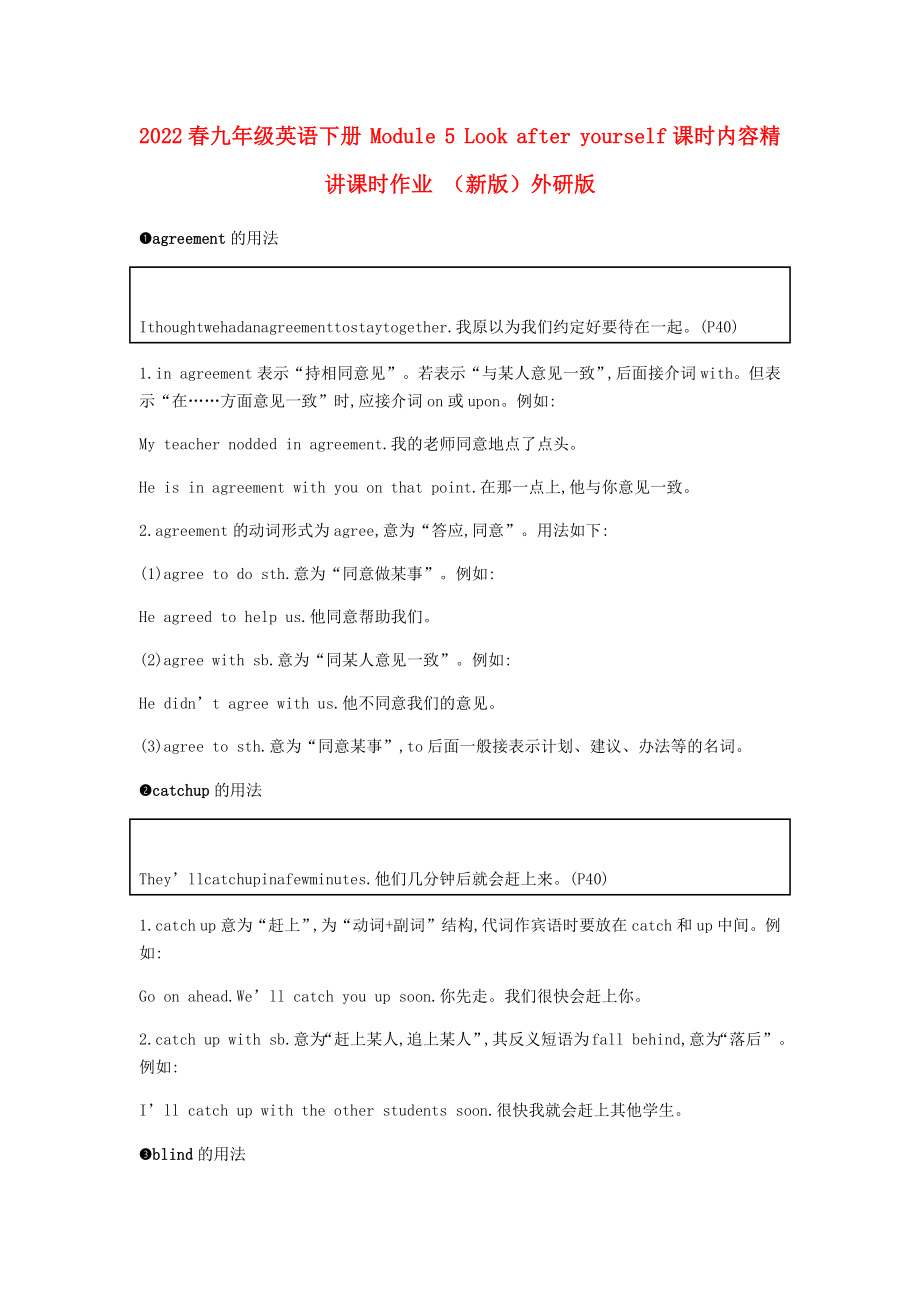《2022春九年級英語下冊 Module 5 Look after yourself課時內(nèi)容精講課時作業(yè) (新版)外研版》由會員分享,可在線閱讀����,更多相關(guān)《2022春九年級英語下冊 Module 5 Look after yourself課時內(nèi)容精講課時作業(yè) (新版)外研版(3頁珍藏版)》請在裝配圖網(wǎng)上搜索。
1����、2022春九年級英語下冊 Module 5 Look after yourself課時內(nèi)容精講課時作業(yè) (新版)外研版
?agreement的用法
Ithoughtwehadanagreementtostaytogether.我原以為我們約定好要待在一起。(P40)
1.in agreement表示“持相同意見”��。若表示“與某人意見一致”,后面接介詞with����。但表示“在……方面意見一致”時,應(yīng)接介詞on或upon。例如:
My teacher nodded in agreement.我的老師同意地點了點頭�����。
He is in agreement with you on that
2�����、point.在那一點上,他與你意見一致。
2.agreement的動詞形式為agree,意為“答應(yīng),同意”���。用法如下:
(1)agree to do sth.意為“同意做某事”�。例如:
He agreed to help us.他同意幫助我們��。
(2)agree with sb.意為“同某人意見一致”�。例如:
He didn’t agree with us.他不同意我們的意見。
(3)agree to sth.意為“同意某事”,to后面一般接表示計劃����、建議、辦法等的名詞�����。
?catchup的用法
They’llcatchupinafewminutes.他們幾分鐘后就會趕上來
3����、��。(P40)
1.catch up意為“趕上”,為“動詞+副詞”結(jié)構(gòu),代詞作賓語時要放在catch和up中間����。例如:
Go on ahead.We’ll catch you up soon.你先走��。我們很快會趕上你��。
2.catch up with sb.意為“趕上某人,追上某人”,其反義短語為fall behind,意為“落后”����。例如:
I’ll catch up with the other students soon.很快我就會趕上其他學(xué)生��。
?blind的用法
WillIgoblind?我會失明嗎?(P40)
1.blind為形容詞,意為“失明的;瞎的”,常用短語:b
4��、e blind in the left/right eye/both eyes表示“左眼/右眼/兩只眼睛失明”�����。
2.be blind to sth.“對某事視而不見”����。例如:
Mr Smith is blind to his son’s naughtiness.史密斯先生對兒子的淘氣視而不見。
3.the blind指“盲人”,作主語時,謂語動詞用復(fù)數(shù)形式��。例如:
The blind usually have good hearing.盲人通常聽力好�����。
?expect的用法
Someonewhoisborntodaycanexpecttoliveaboutthirty-fiv
5、eyearslongerthansomeonewhowasborninthenineteenthcentury.當(dāng)今出生的人預(yù)計可以比出生于19世紀(jì)的人多活35年����。(P42)
expect意為“預(yù)料,預(yù)計,期待”,常見用法:expect to do sth.“期待做某事”;expect sb.to do sth.“期待某人做某事”;expect that...“期待/期望……”。例如:
We expect you to help us.我們期待你來幫助我們��。
They expect (that) the plane can take off on time.他們期望飛機按時起飛�。
?r
6、equire的用法
Inthepast,people’sjobsrequiredmorephysicaleffort.在過去,人們的工作需要更多的體力勞動���。(P42)
require作動詞,意為“需要”,常見用法如下:
1.require后接名詞作賓語,即require sth.,意為“需要某物”���。例如:
These pets require a lot of care and attention.這些寵物需要悉心照顧。
2.require后接不定式作賓語補足語,即require sb.to do sth.,意為“需要某人做某事”�。例如:
What does he requir
7、e us to do?他需要我們做什么?
3.require后接動名詞的主動式或不定式的被動式,即require doing sth.或require to be done,意為“需要做某事”�。例如:
The floor requires washing.=The floor requires to be washed.地板需要擦了。
4.require后接that從句(從句謂語動詞用“should+動詞原形”,其中should可以省略) �����。例如:
The situation required that he be present.這種情形需要他在場���。
?harm的用法
Eatingtoomuchofthewrongfoodwillharmyourhealth.吃太多不合適的食物會損害你的健康�。(P42)
1.harm作動詞時,是及物動詞,后面直接跟賓語;harm還可以作名詞,構(gòu)成短語do harm to sb.,表示“傷害某人”,與do sb.harm同義���。
2.harmful是harm的形容詞形式,意為“有害的”,常構(gòu)成短語be harmful to,表示“對……有害”�����。例如:
Smoking is great harmful to us.吸煙對我們危害很大�����。
 2022春九年級英語下冊 Module 5 Look after yourself課時內(nèi)容精講課時作業(yè) (新版)外研版
2022春九年級英語下冊 Module 5 Look after yourself課時內(nèi)容精講課時作業(yè) (新版)外研版

